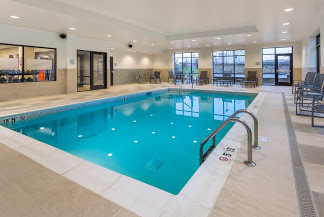
5 Reasons Why Hotels Should Use ICF for Swimming Pools

Building your hotel’s pool with insulated concrete forms (ICFs) can offer you incredible benefits over other pool construction methods. Using ICF for swimming pools makes it faster and easier to build, which will save you time and money. Plus, you’ll get the added benefit of more energy efficiency, durability and lower amounts of maintenance versus shotcrete, precast and cast-in-place concrete.
Whether you desire to build an above-ground or below-ground pool, you can enjoy the design flexibility of ICF pool construction. Detailed below are the immense advantages of ICF hotel swimming pools, and Fox Blocks can help you find the best solution with their various product lines.
Advantages of ICF
ICFs are concrete wall forming systems that stay in place permanently as part of a building structure, instead of removing it after the concrete has hardened. It’s made of high-density styrofoam and provides continuous insulation and sound barriers. They are often used for backing drywall on the inside, and stucco, lap siding or brick on the outside.
ICF is an ideal building material for builders because it's lightweight, easy to install, versatile in its functionality, energy-efficient and secure. Once it was used as a solution for swimming pool construction, it completely changed the architectural landscape.
How ICF Pools Are Built
No matter your intended design, you can build your pool with ICF into any shape or design, without breaking your budget.
You probably already know the first step in the building process is excavation; this includes footings under the walls. If you’re doing an in-ground pool, you should design for footings that are at least 16 inches deep and 20 inches wide, deeper if you need to accommodate for tougher soil conditions.
The next step involves forming for the footings and adding rebar reinforcement for the pool bottom. ICF blocks are assembled to build the pool walls on top of the footings with horizontal and vertical rebar, with vertical bars penetrating into the footings. At this point, rough plumbing and electrical is able to be installed by locating fixtures in the foam blocks.
Concrete is laid over these walls and the floor of the pool at the same time with a conveyor and you can add steel reinforcement and bracing vertically to the footings, equivalent to the specifications provided by the engineer. Stack your ICF walls. Then start with a smooth, compacting fill, such as sand, for your pool bottom.
In order to shed any water to the gravel below or to a perimeter drain, you should install a moisture barrier against the ICF blocks on the outside of the walls before they are completely backfilled. After that, you can install reinforcement and bracing into the floor.
Once all of your reinforcement, strapping and bracing are in place, you can place your concrete into the ICF blocks to complete your structural shell. Voila, you have a structurally sound, insulated hotel swimming pool.
ICF Swimming Pool Benefits
You may already know that ICF is a great material for buildings, but it also has many benefits as the primary swimming pool building material.
1. Save on Time & Labor
Building an ICF pool requires less time and labor than constructing a concrete pool because the modular panels are easy to handle, require no heavy equipment for delivery, lifting or cutting, and unlike concrete pool wall systems, ICF walls don’t require precise excavations. If you accidentally over-dig at your excavation site, the only additional cost is to backfill the walls once they are placed.
Plus, if you utilize ICF for your hotel building’s envelope and demising walls, you can easily use the same contractor to build the pool walls, landscaping or retaining walls at the same time because the ICF team will already be mobilized on-site. This way you aren’t waiting for the hotel to be finished to start the pool.
2. Increased Durability & Longevity
ICF pools have higher durability: They are disaster-resistant, mold-resistant and have a longer lifespan with lower maintenance costs than pools constructed by other materials. Plus, they have an extremely long lifespan, easily lasting 200 years or more.

3. Increased Design Flexibility
You can create any type or shape pool you want, whether above ground or below ground. This makes ICFs perfect for community pools, custom-shaped pools, small exercise pools and more. There’s no limit to your design options.
4. Easy to Update
Plus, they are easier and cheaper to update than other materials because they have more consistent wall finishes than standard concrete pools. When constructing an ICF pool, a pool liner is installed over the pool plaster and lasts up to 10 years.
5. Reduced Heating Costs
ICF swimming pools have reduced costs for heating the pool water, with operational cost reductions similar to insulating the entire outside hotel building envelope. A pool loses 80% of its heat through the bottom and sides because the ground conducts heat more easily than the surface air. Not so with ICF.
Pools built with ICF have continuous insulation on the interior and exterior sides and bottom of the pool. This reduces heat loss and stabilizes the pool’s temperature, decreasing your energy costs by up to 60%.

Fox Blocks Is the Best Solution for ICF Swimming Pools
ICF pools, like ones built with the Fox Block Series, are energy-efficient, durable, low-maintenance and easily adaptable to almost any pool design. With Fox Blocks, your ICF pool will be constructed quicker, saving you both time and money.
Fox Blocks has experience with hospitality projects, like the reconstruction at Centre Park’s Holiday Inn & Conference Center. Their project was completed two months early and has since qualified for a Duke Energy rebate since it is performing 30% better than ASHRAE standards for hotels.
No matter your needs, Fox Blocks has a product line with the specific configurations you’re looking for. Check out Fox Blocks’ product offerings, and when you’re ready to see a difference in your projects, click here to contact us.

